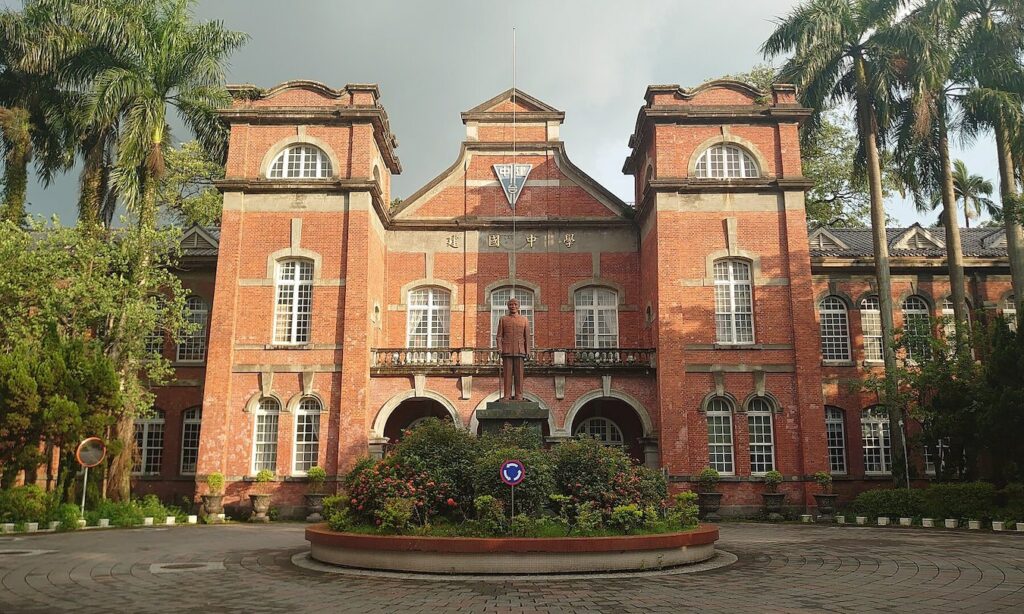by Brian Hioe
語言:
English
Photo Credit: 寺人孟子/WikiCommons/CC BY-SA 4.0
ONE SEES THE return of familiar issues in the presidential election with pan-Blue candidates criticizing new textbook guidelines that reduce the teaching of classical Chinese. This has been framed by both KMT presidential candidate Hou You-yi, TPP presidential candidate Ko Wen-je, and former president Ma Ying-jeou of the KMT as “desinicization.”
The three pan-Blue politicians were leveraging on criticisms of the new guidelines by Ou Kui-chih, a teacher at the Taipei First Girls’ High School, traditionally Taiwan’s most elite high school for girls. By contrast, however, DPP presidential candidate Lai Ching-te has framed the guidelines as not intended to mandate the reduction of classical Chinese, but allow publishers to decide what content to include or not. Other DPP politicians, such as vice premier Cheng Wen-tsan, have responded by reiterating that classical Chinese is still a major part of the curriculum. Ou was later found to have been a supporter of the implementation of the National Security Law in Hong Kong and critical of the A4 Revolution in China.
This is not the first time that the KMT has hit out at the specter of “desinicization” or the reduction of classical Chinese content. This was particularly visible in 2016 and 2017, with the claim that the reason why a generation of Taiwanese young people had turned against the KMT was because of the DPP’s successes in fomenting “cultural Taiwanese independence” and “desinicization” among Taiwanese young people. The claim was that textbooks that increased the teaching of Taiwanese history and culture instituted during the Chen Shui-bian administration had resulted in the ideological indoctrination of Taiwanese Millennials.
Nevertheless, the claim that reducing the amount of classical Chinese used in schools will lead to “desinicization” is probably a dog whistle for the pan-Blue base, intended to rally them in outrage against the DPP. After all, classical Chinese texts will continue to be part of the curriculum, and students are free to research them in their own time.
Even if the DPP is clearly less interested in the teaching of cultural texts from China, the new regulations do not ban classical Chinese texts–though the pan-Blue camp may seek to frame it as such, to reinforce their base’s sense of having a cultural identity that is under assault by the DPP. This is an ironic stance from the KMT, seeing as that the KMT previously banned or otherwise instituted restrictions on the public use of Taiwanese Hokkien, Hakka, Indigenous languages, in order to reinforce the hegemony of Mandarin. The KMT, of course, has no compunction about seeking to stamp out languages, and seeing it raise the claim in the present is ironic. Indeed, the KMT has at other points objected to DPP presidential administrations seeking to fund Taiwanese Hokkien television and radio programming.
Despite the fact that classical Chinese is a language which may share the same characters as modern Chinese but has a significantly different grammar, syntax, and word usage, in recent memory, 45% to 65% of language learning materials used in schools in Taiwan consisted of classical Chinese. As such, calls to reduce the amount of classical Chinese used in schools have also been to try and improve the teaching of contemporary and vernacular Chinese, which is more useful for students’ daily use of language.
 Photo credit: Yu tptw/WikiCommons/CC BY-SA 4.0
Photo credit: Yu tptw/WikiCommons/CC BY-SA 4.0
As such, when groups such as the Association for Taiwan Literature called for reducing the amount of classical Chinese used in Taiwan in the past, they framed this not as a political matter. Instead, they framed such calls as aimed at ensuring that Taiwanese students receive proper linguistic training, so as to ensure that reading comprehension rates in Taiwan do not decline.
China’s Taiwan Affairs Office has itself weighed in on the matter on other occasions in which there were calls for reducing the amount of classical Chinese in the curriculum. When this occurred, China was more or less echoing the KMT’s talking points. However, it is generally in China’s interests to paint the DPP as ideologically committed to a radical pro-Taiwanese independence political agenda, and claiming that the DPP is bent on its “desinicization” drive is part of that. China has even been successful in convincing some DC policymakers to follow suit with condemning the DPP over “desinicization.”
At the same time, one notes that historical textbooks in Taiwan have themselves been a matter of controversy, regarding the significant amount of material about Chinese history. In 2015, when the Ma administration tried to roll back changes to the curriculum made during the Chen Shui-bian presidency, this was resisted by high school students themselves, who occupied the Ministry of Education in a weeklong occupation. This reflects how such issues continue to be at stake in Taiwan.

